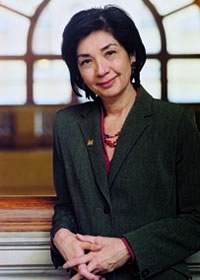A Massachusetts judge wants to boost the percentage of women on the bench
Nationwide, only 24 percent of all judgeships are held by women. In federal courts, women make up barely 20 percent of the bench. Massachusetts Appeals Court Judge Fernande “Nan” Duffly ’78 wants to see these numbers rise and is passionate about making it happen.
“For the two decades of women coming out of top law schools and excelling in the profession, you’d expect to see them in greater numbers” in the judiciary, says Duffly, who became a Probate Court judge in Massachusetts in 1992 before being named to the Appeals Court in 2000.
One problem, she says, is that large law firms—an important pipeline for the judiciary—have few women partners: just 17 percent nationwide, according to the latest statistics. Yet, unlike many around her, Duffly is optimistic about closing the gap.
“Everybody you talk to says, ‘We cannot change this,’ or, ‘We’re doing what we can,’” says Duffly, who before becoming a judge was a partner at Boston’s Warner & Stackpole (now Kirkpatrick & Lockhart Preston Gates Ellis), which she joined because of the firm’s commitment to pro bono and its relatively high number of women lawyers.
Duffly is certain that change is possible, and she’s seeking it through several avenues. She has launched a task force on the retention and promotion of women in the legal profession at the National Association of Women Judges, where this year she is serving as president, the first Asian-American to lead the organization (she was born in Indonesia). She helped create a similar task force in the Boston area, where she’s working with women lawyers and judges to discuss changing law firm culture to help women advance.
In September, at Celebration 55: The Women’s Leadership Summit, which marks the 55th year since the first women graduated from HLS, Duffly will be among a number of speakers addressing these and other issues.
“People ask, ‘What do judges have to do with women in law firms?’ For one thing, judges as a group have terrific convening power, as does Harvard,” she says. “We can shed light on issues, and people tend to pay attention.”
